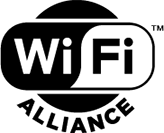Please fill out this form to download your file. If you work for a Wi-Fi Alliance member company you may request members-only access.
Connected homes are replete with a variety of smart objects collectively known as the Home Internet of Things (IoT). Due to Wi-Fi®’s ubiquity throughout the world, its wide-ranging technology portfolio, and its strong legacy of interoperability, Wi-Fi is certain to play a role in almost every Home IoT environment. The nature of Home IoT is that a wide range of products, manufactured by different companies, need to work in unison. Wi-Fi is designed for interoperability at its core by adhering to IEEE standards, and as such, it offers pervasive connectivity across control devices, like smartphones, as well as access points (APs) and connected objects. Personal data exchanged through the Home IoT network is safe with Wi-Fi due to its inherent security protocols, and the high performance that Wi-Fi offers ensures that IoT devices remain consistently connected and operational, which is especially important for high-stakes situations such as eldercare.
Wi-Fi Alliance® offers Wi-Fi CERTIFIED® testing and certification to ensure interoperability with other Wi-Fi CERTIFIED devices. While companies may create products based on the IEEE 802.11 standard that are not certified, they do not carry the Wi-Fi brand or certification logo. This is a serious detriment to a product’s credibility as the Wi-Fi CERTIFIED seal of approval means that a product has been tested in a variety of ways to validate its quality and reliability. Certification is especially important for IoT devices as they often must interoperate with numerous products in order to provide the Home IoT experience that homeowners and renters are looking for. Wi-Fi CERTIFIED also benefits device vendors by giving confidence to consumers, solution integrators, and service providers that products perform well and are backward compatible with earlier versions of Wi-Fi. In addition to the many benefits of Wi-Fi CERTIFIED described above, it is also a mandatory requirement for Matter certification, which further ensures device compatibility.


